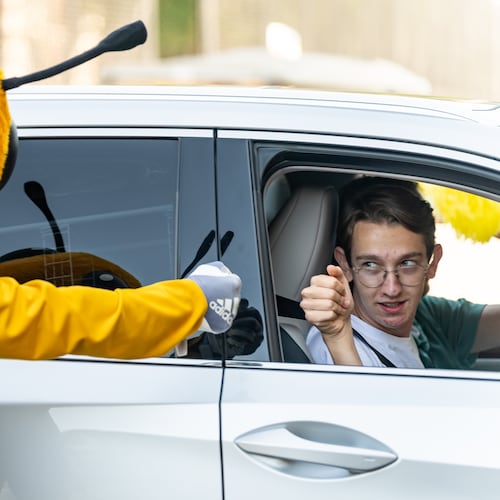Hoping to maintain momentum they built last year, student organizers of the March For Our Lives movement seeking an end to gun violence have taken to the streets this summer.
The organization started and led by students who survived the Feb. 14 shooting that killed 17 students and staff members at a Parkland, Fla., high school has put together a summer tour called Road to Change. Its East Coast leg began July 28 in Tallahassee and will end Aug. 12 in Newtown, Conn. It focuses on voter registration and keeping the issue front of mind.
“It’s sad that it took that event for me and others to step up,” said Daniel Williams, a graduate of Parkland’s Douglas High. “My community is broken and I need to make my voice heard.”
A rally Sunday night at Georgia State University's Rialto Center for the Arts with about 300 in attendance was just the second stop on the tour and preceded a larger event Monday night at Eagles Nest Church in Roswell. It was originally planned for Centennial High School, but organizers said the Fulton County Board of Education rescinded the permit at 5 p.m. Friday.
The Rev. Lee Allen Jenkins said it took him “less than a millisecond” to offer up his church.
“We care about safety, giving young people a voice and standing up for issues that are important,” said Jenkins. “We have a history of speaking out on social issues as a church — racial reconciliation, social justice, sexual identity, mental health — we try to help develop a biblical world view and not run away when the conversation is uncomfortable.”
Organizers estimate the turnout was about 1,000 with 600 in the church sanctuary and another 300-plus in the overflow rooms and outside who couldn’t make it inside the building. Among attendees were the Rev. Bernice King, daughter of slain civil rights activist Martin Luther King Jr., and Lucy McBath, a Georgia Democratic candidate for the 6th Congressional District. Neither spoke during the event.
Some who did speak touched on several subtopics.
Bria Smith, a high schooler from Milwaukee, urged participants not to categorize gun violence as something that only affects suburban students. “I live in the inner city and gun violence is a daily occurrence,” she said vehemently. “When I was younger we used to play a game where we tried to identify what kind of gun the shots were coming from.”
Lukas Tull, a Lassiter High student, wanted to know how to bring school administrators on board.
"We were actively prevented from participating in the walkout," he said. "We were threatened with having our prom taken away." He was referring to an event April 20. That was the 20th anniversary of the mass school shooting in Columbine, Colo., and students across the nation walked out of class to keep the issue of gun violence in schools in the spotlight.
With some schools already in session and others starting soon, many kids voiced fears about safety. Rising sophomore Lauren Hogg shared her fears about returning to Marjorie Stonemen Douglas High.
“I have to go back to school in 16 days. … I’ll have to walk through metal detectors with news cameras everywhere,” she said. “My school has been turned into a prison. I try to focus on my studies and to be a leader, but I’m still scared.”
March For Our Lives organizers want legislators to push for action on these 10 areas:
1. Fund gun violence research.
2. Eliminate absurd restrictions on the ATF.
3. Universal background checks.
4. High-capacity magazine ban.
5. Limit firing power on the streets.
6. Funding for intervention programs.
7. Extreme risk protection orders.
8. Disarm all domestic abusers.
9. Gun trafficking.
10. Safe storage and mandatory theft reporting.
About the Author
Keep Reading
The Latest
Featured





